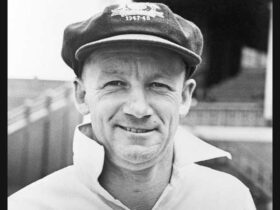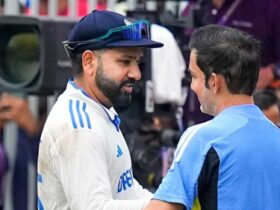Australia and India conjured up the most intriguing of what-ifs in the 22 overs that were possible on the fifth day.
Australia 445 (Head 152, Smith 101, Carey 70, Bumrah 6-76) and 89 for 7 dec (Bumrah 3-18) drew with India 260 (Rahul 84, Jadeja 77, Cummins 4-81, Starc 3-83) and 8 for 0
Rain had the last word at the Gabba, as was widely expected, but only after Australia and India conjured up the most intriguing of what-ifs in the 22 overs that were possible on the fifth day of the third Border-Gavaskar Test match.
After taking the final India wicket four overs into the day’s play and securing a 185-run first-innings lead, Australia made one final push for victory, going hard at India’s bowling, losing quick wickets in the process, and declaring at 89 for 7 after 18 helter-skelter third-innings overs. That left India with a target of 275 in a theoretical 54 overs. Only 2.1 were possible, as bad light drove the players off the field before rain came back down to signal an early finish.
Australia’s brief innings on day five gave a glimpse of all the possible rain-free finishes this match could have had. There was pronounced seam movement and uneven bounce, and Jasprit Bumrah, Akash Deep and Mohammed Siraj ripped out five wickets in the space of 11 overs. But some of the wickets also came from Australia’s intent to score quickly. They promoted Mitchell Marsh to No. 4, batted Travis Head above Steven Smith, and kept going for their shots. The runs came at a fair rate too, with the pace of the pitch allowing Head, Alex Carey and Pat Cummins to rattle off a combined 59 off 49 balls.
Given all the help for the new ball, Australia could have envisioned bowling India out. Given the scope for run-scoring, and the fact that Australia were without one of their three fast bowlers, India could have imagined making a bid for victory if they managed to see off the early overs relatively unscathed. As it happened, the draw may have been the best result for the series going forward, with two Tests to go and the teams locked 1-1 on Boxing Day.
Australia’s declaration harked back to the 1950 Test on this same ground, when England declared at 68 for 7 and then Australia at 32 for 7 as both teams tried to make the best of a sticky pitch after a spell of rain. Such events are exceedingly rare in the days of covered pitches, but something not too dissimilar happened on this day with Australia declaring at 89 for 7.
One man who may have been a touch displeased at that point was Bumrah; he had just come back for a new spell and dismissed Cummins with a clever slower ball. It was his ninth wicket of the match, and he was so close to bagging his first ten-for, one of the few feats he has yet to achieve in his remarkable career.











Leave a Reply